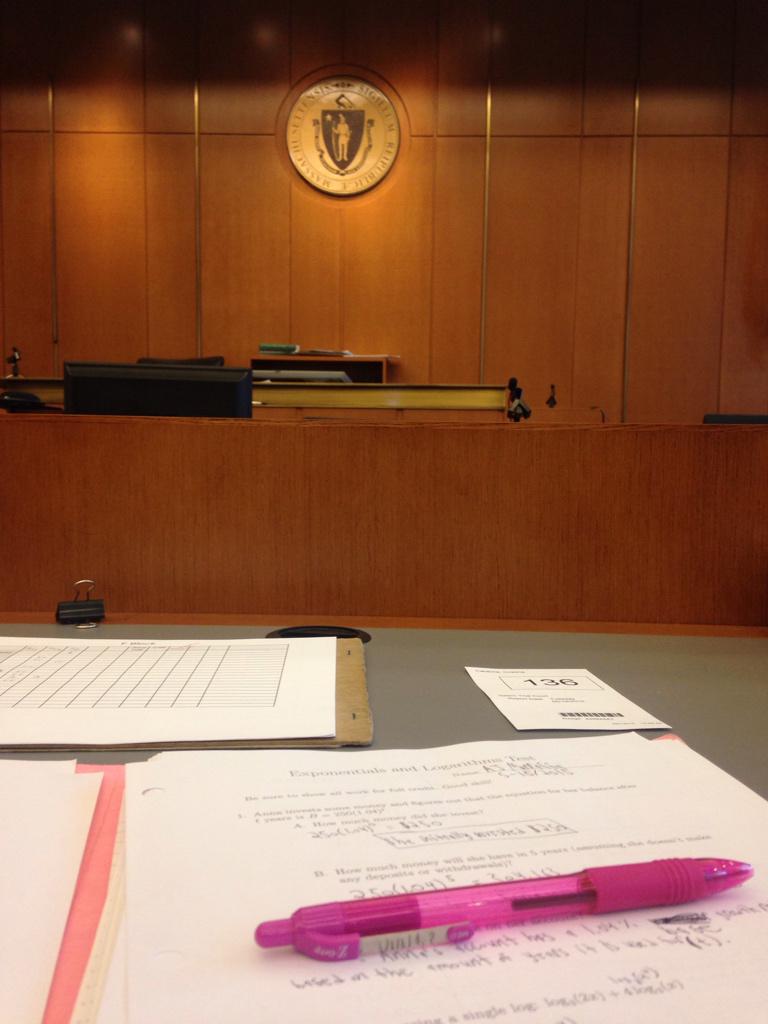When I arrived I stood in line to hand in my questionnaire (age, ethnicity, profession, marital status etc.) I imagine they collect this information to try to get a diverse jury. When I submitted my form the person looked my name up on a list and told his co-worker the number to give me. I was pleased to see my juror number wasn't assigned by the time I arrived, but had already been randomly assigned. The difference between random and diverse is one that most people struggle with, we've already seen both and the day has yet to officially start! As part of the 'Welcome to Jury Duty' video they speak to the randomness:
"Random means you can get called three times but your neighbor hasn't been called yet. It's like getting heads three times in a row."
The court room isn't so different from the classroom. There are certain behaviors that are expected, and the court marshall recognizes that those behaviors need to be taught. It's not reasonable to assume that everyone knows how to act in front of a judge, so before the judge entered the room the jury pool is reminded to put away phones, remove hats and close books while the judge is speaking. When the judge enters the room we are instructed to rise and then told when it is appropriate to sit. It was a good reminder that everyone needs a friendly prompt to behave appropriately. (Even if they're in high school and we wonder "How could they possibly not know this yet?!")
Next up we moved to a courtroom to hear about the case they're building a jury for. The case involved a girl who was sexually abused as a child. Did you know the first person someone discloses to is required to go into court? At least in Massachusetts it's the law - there must be testimony from that first disclosure. I remember being told at some orientation that if a student starts sharing abuse to get a counselor immediately. It seems like a terrible thing to do - "Stop. Don't tell me, even though I'm the one you trust enough to divulge this deeply personal information." I understand that a counselor is better prepared to have a conversation with the student and is also more attuned to details that I may not be able to share in the courtroom. I still think I'd let the student finish their story and then go with them to the counselor. But it's important that I make the decision aware of the fact that I will have to testify - and pay extra attention to detail.
Next up we moved to a courtroom to hear about the case they're building a jury for. The case involved a girl who was sexually abused as a child. Did you know the first person someone discloses to is required to go into court? At least in Massachusetts it's the law - there must be testimony from that first disclosure. I remember being told at some orientation that if a student starts sharing abuse to get a counselor immediately. It seems like a terrible thing to do - "Stop. Don't tell me, even though I'm the one you trust enough to divulge this deeply personal information." I understand that a counselor is better prepared to have a conversation with the student and is also more attuned to details that I may not be able to share in the courtroom. I still think I'd let the student finish their story and then go with them to the counselor. But it's important that I make the decision aware of the fact that I will have to testify - and pay extra attention to detail.

After a few group questions where we got to vote using our numbers - a mix between an auction and A/B/C/D cards - we were sent to an adjacent courtroom to wait for our individual questioning. Since we were told to make ourselves comfortable I spread out my grading in a lawyer box. Teachers, we'll grade anywhere!
Finally when we got to the individual questioning the judge asked if I could act on this jury without my experience as a foster parent influencing my decisions. I struggled with this question. Can anyone truly answer that they're impartial? I can promise to be aware of my potential bias and to work hard to make a conclusion that isn't influenced by them. But my experience is absolutely going to influence my thoughts. During the group questioning we were asked if we had already formed an opinion on the defendant (who was in the room). No one answered yes, and I wondered what kind of person would admit to it. But I had made judgments based on his attire, posture, etc. We all make judgments about all the things we see. What we do with them and whether we're aware of them is what makes the difference. I wonder if a judge would declare us eligible to serve on the jury in our own classrooms. I know I could use more frequent reminders of my biases and the importance of judging as impartially as I can.
No comments:
Post a Comment